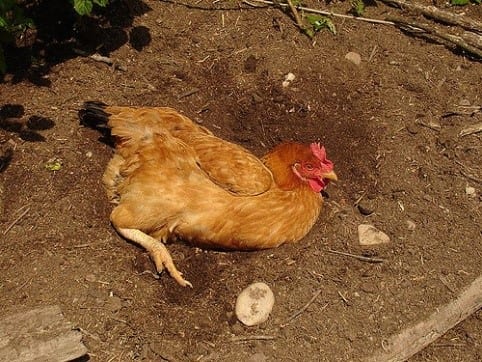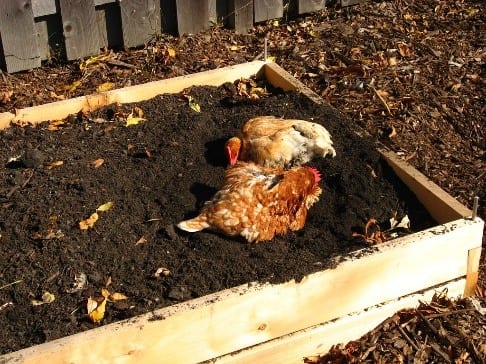Poultry Shopping
No matter what kind of poultry you decide to farm, chicks are available from your local agricultural supplier or via the mail in most of North America. Check online for suppliers, you won’t have any trouble.
And, of course, before you buy anything, you’ll need to be confident in what types are most suited for your specific climate and which of these make good foragers.
Tips For Healthy Chickens
There are few things more miserable looking than an unwell chicken… Luckily for the debutant farmer, chickens (and domesticated poultry in general) are easy to keep healthy with some basic care—it really just comes down to hygiene and nutrition.
Dust Baths
Chickens like to clean themselves by laying and shuffling their feathers in dry, fine dust, dirt, and/or sand from time to time. Allow them access to this or bring a dust bath every now and again to keep them clean. You could build a small wooden area on or near their run and fill it with fine, dry sand or soil to accommodate this need or simply bring a dust-filled cat litter tray to them once a week or so.
 |
 |
 |
Water Supplements
Add a tablespoon of apple cider vinegar to your chickens’ water every day as you change it for optimum health and shiny feathers. A crushed clove of garlic in the waterer every week is beneficial, too.
- Consider how many eggs you and your family eat in a month. Work out how many hens you would need to supply this number of eggs per month. (The rule of thumb is five eggs per hen per week.)
- Think about how many pounds of chicken you consume in a month. If the average broiler is harvested at a dressed weight of 4.5 to 5 pounds, how many birds would you need to supply your own needs in poultry meat?
- Estimate how much you spend on eggs and/or chicken meat, depending on what you want out of your chicken endeavor, and see how much money can be saved over a year if you produce your own. Compare against the cost of building a coop and the possible purchase of feed supplements if you need them.
- Once you have raised a small flock of birds, determine if you have enough space to fulfill your own egg and chicken meat needs and then some. Ask around to see if you have friends, family, or neighbors who might want to buy farm-fresh, organic eggs or meat from you instead of their grocery store. Take pre-orders from anyone interested, remove market risk from your farming plan. Buy enough chicks to fulfil these orders (allowing a 5% mortality rate) and raise them for sale.
- Calculate the income you can earn long-term from this as a cottage industry.
Further Resources:
- If you haven’t already, give a listen to the audio recording from our most recent Self Sufficiency Conference in Belize: Backyard Poultry (With A Focus On Belize)—Housing, Feeding, Breeds, Eggs, Meat, And Pest Control and follow along with the PowerPoint presentation.
Happy homesteading,

Con Murphy
Your Total Independence Coach, Live and Invest Overseas
